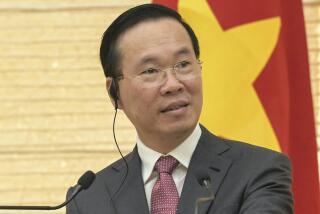China’s Graft Crackdown Hits High Places
- Share via
BEIJING — Chinese Communist Party chief Hu Jintao warned Friday that corruption is undermining the party’s authority and called for a renewed crackdown in the wake of several recent high-level scandals.
Hu’s rallying cry, made at a meeting commemorating the 85th anniversary of the founding of the party, follows disclosures in recent weeks that a senior military official and a vice mayor of Beijing overseeing construction for the 2008 Olympics had been snared in corruption investigations.
“There are continued cases of leading officials abusing power for private gain, engaging in graft, bending the law and falling into corruption and dissoluteness,” Hu, also China’s president, said in a speech broadcast live on state television. “If a ruling party cannot maintain flesh-and-blood ties with the people, if it loses the people’s support, it will lose its vitality.”
On Thursday, Vice Adm. Wang Shouye, 62, a deputy commander in China’s navy, was dismissed and stripped of his seat in parliament. On the same day, Beijing authorities detained a vice governor from eastern Anhui province on charges of accepting bribes.
This followed the sacking last month of Liu Zhihua, 57, a deputy Beijing mayor responsible for urban development and Olympics projects. State media cited “corruption and dissoluteness,” the same wording Hu used in his speech, and the city government said Liu’s “wrongdoings are clear, the evidence irrefutable and the circumstances serious.”
The chairman of Capital Land, the city’s largest state-owned development company, also is being questioned by party investigators in connection with the case.
The firing of Liu almost certainly was made with the approval or at the direction of top leadership. The central government has waged repeated campaigns in recent years against corruption, arresting thousands of officials and even executing some, but officials of Liu’s and Wang’s rank rarely have been removed.
Given the widespread corruption in China, the lack of a free press and the scant information generally released about such cases, analysts say it’s difficult to pinpoint the motivation behind the latest series of investigations, especially considering the blow to national prestige of having a scandal linked to the Olympics.
China, which is spending about $40 billion to build sports venues and upgrade infrastructure for the 2008 Summer Games, promised the International Olympic Committee that the event would be free of corruption. All too often, those implicated in scandals are seen not necessarily as being more guilty than others, but rather as being less protected politically.
Some say the deals involving preparations for the Olympics may be so rife with graft that the leadership decided it was better to act now rather than wait until even more global attention is focused on the country as the Games approach.
Others see Wang’s and Liu’s cases as largely symbolic steps designed to intimidate other corrupt officials and demonstrate that the regime means business, part of a centuries-old Chinese tradition of setting an example by “killing the chicken to scare the monkey.”
There also is speculation that the corruption cases are merely maneuvers to eliminate or sideline potential opponents or their allies before next year’s 17th Party Congress. Liu has been replaced as vice mayor by Ji Lin, an official who rose through the Communist Youth League, Hu’s power base.
Wang Yukai, professor of the National School of Public Administration, said Hu has made corruption a major priority since taking control in 2003. He has strengthened party rules, shifted personnel and given investigators more authority internally.
“It’s too early to judge whether the campaign is successful,” Wang said. “Corruption didn’t happen overnight nor involve just a few individuals. It’s a problem of the whole system and society.”
Others say that Beijing has failed to encourage or tolerate any sort of systemic checks and balances that might aid in the fight.
On the contrary, it has tightened control of the press and other potential watchdogs. Instead, the leadership has relied on timeworn and largely ineffective study classes and moral slogans in a bid to check corruption among the nation’s 70 million Communist Party members.
“These latest scandals suggest members are not listening to the slogans,” said one party member.
“Everyone, from senior party members to ordinary members, knows this is all formality. Hu is good on the formal stuff like this, but it all boils down to one fundamental point: It’s the problem of a one-party state.”
More to Read
Sign up for Essential California
The most important California stories and recommendations in your inbox every morning.
You may occasionally receive promotional content from the Los Angeles Times.













